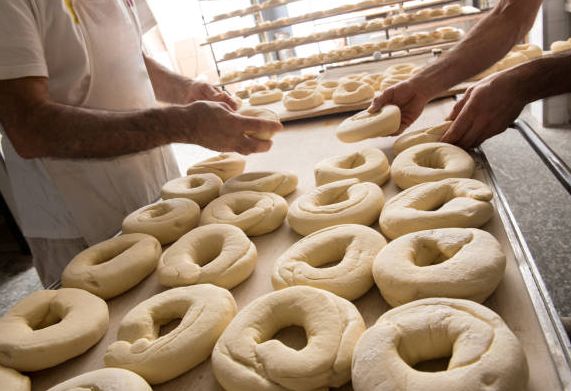FOOD
Practicing the Revolution: Making Bagels – 1974
By Don Orr Martin
Controlling our diets and access to healthy, unprocessed foods was an important way for us to reclaim some power in our lives during the era of protest and change. An extensive network of food co-ops and wholesale suppliers stitched together several communities around Puget Sound in the 1970s and ’80s. Olympia co-op volunteers established strong ties to these sister businesses. For a while we did a sort of practicum, taking temporary jobs with other groups and wholesale operations to learn how they were run. I did a work exchange in Seattle in the mid-1970s with Cooperating Community Grains and Little Bread Company.

CC Grains was a warehouse in Ballard that distributed sacks of oats, rice, millet, barley, bulgur, various nuts, dried fruits, barrels of honey, cooking oils, and other bulk items. We workers at the warehouse bought from farmers and suppliers, unloaded semis, took regular phone orders from various participating storefronts, and provided customer service. We mixed our own blends of granola, drove small delivery trucks, and learned inventory and bookkeeping practices. It was hard work, often lifting and stacking 50 and 100 pound sacks, and hand mixing measured quantities of oats, nuts, and honey in big vats, then packaging and labeling products in smaller units.
During those three months I stayed in a collective household in the Madrona neighborhood up the hill from Lake Washington. We were all young working-class radicals. One of the women was learning to be an apprentice electrician, another taught women’s self-defense classes, another was a part-time reporter for the Facts, an African American-owned newspaper in the Central District. One guy was a student, another a bartender. I slept on the couch. Every morning I caught the bus on Union Street to downtown, then transferred going north to Fisherman’s Terminal. It was a route frequented by a mix of poor folks, nine-to-five office staffers, dishwashers, drug addicts, sex workers, and a few suits. It was my first immersion into the big city work-a-day world.
A couple of times a week I did a stint at Little Bread Company working whatever non-baker jobs they needed that day—often just cleaning. I can’t remember now where their bakery was exactly, I want to say Lake City. Both CC Grains and Little Bread Company employed mostly women and strove to be non-hierarchical workplaces, sharing all levels of jobs and practicing criticism-self criticism to resolve conflicts. Members of the bakery were especially political. As they worked the mixers and ovens they debated the hot issues of the day.
One comical incident I remember at Little Bread was when they put me on the bagel machine tying ropes of dough into proper knots. The dough was mechanically cut and rolled into tubular log shapes, which then traveled down a conveyor belt at a quick speed. Workers on either side grabbed every other one, performed a quick knot-tying maneuver, pinched the ends, and put them back on the conveyor. Someone at the end carefully arranged the bagels on trays to proof and be boiled. I was an experienced home baker and I had several Jewish friends who taught me the authentic New York style of bagel making, so I loved this particular job and was good at it.
This one day, the regular bagel line workers got into an argument concerning Panther Huey P. Newton’s theory about organizing Black Americans as a separate nation. I listened attentively but because I had not read Huey’s position, I offered no opinions. Several of the line workers, however, felt passionately about this issue. Voices raised, tempers flared. They decided to take it out into the alley to avoid disturbing everyone else, and to have a smoke.
They left me alone with the bagel machine.
They neglected to explain how to control the speed or shut it down. For a while I had no trouble keeping up, but soon I was like Lucy in the chocolate factory. I tied as fast as I could, but I was getting behind. As I knotted and pinched with one hand, I moved other dough logs back up the conveyor line, especially when a tray got full and I had to transfer it to a rack. Unlike Lucy, I couldn’t eat the raw product or stuff it in my pockets, so I used another tray for the excess dough, hoping that the rest of the crew would come back real soon. Please come back. Real soon. Finally someone noticed my plight and shut everything down. There were a few batches of misshapen bagels that day.
We encourage readers to contact us with comments and corrections. Disclaimer

Great story!